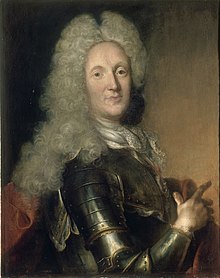Nicolas de Catinat

Nicolas III de Catinat de La Fauconnerie, Seigneur de Saint-Gratien (born September 1, 1637 in Paris , † February 25, 1712 at St.-Gratien Castle near Saint-Denis ), was a Marshal of France .
Life
Catinat, son of Magistrate Nicolas II. De Catinat and Catherine Poille, who came from the minor nobility of the County of Perche , was initially a lawyer, then entered the military and distinguished himself under the eyes of the king during the siege of Lille in 1667 was transferred as a Sous-lieutenant to the Regiment des Gardes françaises . He took part in the Dutch War from 1672 to 1675 , was transferred to the General Staff of the Army of Marshal of Rochefort in 1676 and soon afterwards to Brigadier des armées du roi and commanders in Dunkirk , later to General Inspector of the Army and in 1681 to Maréchal de camp .
In 1686 he was sent by Louis XIV against the Waldensians in southern France, an executioner service that contradicted his otherwise humane nature. He then became governor of Luxembourg in 1687 and distinguished himself as lieutenant-général at the siege of Philippsburg in 1688 . From François de Louvois he then received the supreme command in Jülich and Limburg and the instruction to completely devastate the country ( bien brûler ). Still, he acted as humanely as possible.
On August 18, 1690, he defeated Duke Viktor Amadeus II of Savoy, who had concluded a secret alliance with Emperor Leopold and Spain, in the Battle of Staffarda , took Susa , besieged Nice , Carmagnola and the Montmélian Castle in 1691 and conquered most of Piedmont . He was promoted to Marshal of France in 1693 for the successful defense of the Dauphiné . He then won the Battle of Marsaglia and brokered the peace in Turin on August 29, 1696 . After that he soon went to Flanders as commander of a corps , where he captured Ath on June 5, 1697 .
Since the Peace of Rijswijk (1697), Catinat lived as a private citizen in Paris until 1701 when he was given the command of the French army in Milan. Defeated by Prince Eugene in the Battle of Carpi on July 9, 1701 , he lost command, but in 1702 was again in command in Alsace . After saying goodbye soon afterwards, he died on February 25, 1712 on his estate in St.-Gratien near St.-Denis (previously property of the Dukes of Montmorency ). He is buried in the local chapel.
Catinat was not only a brave, prudent general, but also a character worthy of respect because of his humanity and unselfishness, and therefore very popular with the people and the army. His memoirs were published in 1819 (Paris, 3 volumes). In honor of this man, the city of Saint-Gratien adopted the coat of arms of the Catinats as the city's coat of arms in July 1994. A square in Nantes is named after him.
literature
- Louis Marie de Créqui: Mémoires pour servir à la vie de Nicolas de Catinat. Paris 1775, ( archive.org ).
- L. Dussieux: Les Grands Géneraux de Louis XIV. Librairie Victor Lecoffre, Paris 1888, pp. 270-287.
- Karl Landmann : Catinat. In: Bernhard von Poten (Ed.): Concise dictionary of the entire military sciences. Volume 2, Leipzig / Bielefeld 1877, p. 197 f, ( Textarchiv - Internet Archive ).
- Emmanuel de Broglie: Catinat, l'homme et la vie. Paris 1902, ( archive.org ).
- Bruno Jousselin, Ghislaine Chouet: Catinat - histoire d'une famille. 2010, ISBN 2-900122-90-2 .
Web links
| personal data | |
|---|---|
| SURNAME | Catinat, Nicolas de |
| ALTERNATIVE NAMES | Saint-Gratien, Nicolas III. de Catinat de La Fauconnerie Seigneur de (full name) |
| BRIEF DESCRIPTION | French general and Marshal of France |
| DATE OF BIRTH | September 1, 1637 |
| PLACE OF BIRTH | Paris |
| DATE OF DEATH | February 25, 1712 |
| Place of death | Saint-Gratien near Saint-Denis |

